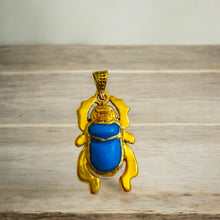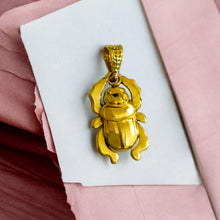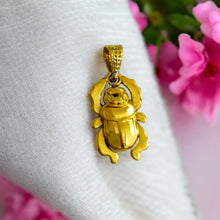
Channel the mystic energy of ancient Egypt with our handcrafted Gold Egyptian Scarab Pendant Necklace — a stunning fusion of spiritual symbolism and minimalist design. This double-sided talisman features a radiant blue turquoise stone on one side, revered for its healing and protective qualities, while the reverse side is beautifully sculpted in the sacred form of a scarab beetle, a powerful symbol of transformation, rebirth, and divine protection.
Expertly handmade with a vintage-inspired finish, this pendant is crafted from a unique alloy of 5% gold and 95% brass, offering a warm, antique glow that evokes timeless elegance. Its universal design makes it a meaningful gift for both men and women, and it fits effortlessly on any chain up to 5mm thick.
As a piece of spiritual jewelry, this scarab pendant serves not only as an accessory but also as a talisman for strength, renewal, and inner balance. The soothing blue turquoise at the heart of the design is said to connect the soul to higher realms and encourage emotional healing.
To care for your pendant, avoid prolonged exposure to water, chemicals, or perfumes. Gently wipe it with a soft cloth after wearing to preserve its vintage finish and energy. Store it in a cool, dry place to keep its beauty alive for years to come.
Historical Glance: In ancient Egypt, scarabs were cherished as sacred amulets symbolizing the sun, eternal life, and the soul’s journey. Worn by pharaohs and commoners alike, they were believed to carry divine power and offer protection in both life and the afterlife.
Thank you for visiting our shop. We’re honored to share this meaningful piece with you. If you have any questions or need assistance, please don’t hesitate to reach out — we’re here to help!













